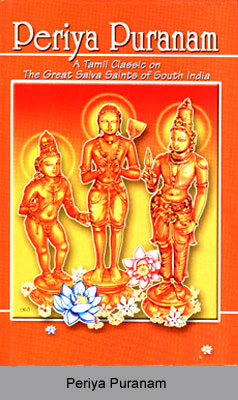 Periya Puranam, meaning the great epic, is also known as Tiru Thondar Puranam, which literally means the epic of the holy devotees. Periya Puranam is a Tamil poetic work which depicts the celebrated lives of the sixty three Nayanaars who were the saint poets and followers of Tamil Shaivism. The poetic account was composed by Sekkizhar (Cekkilar) during the 12th century. Evidence of trade with West Asia is provided by the Periya Puranam, which is part of the body of Shaiva religious works. Sekkizhar wrote and compiled the Great epic known as Periya Puranam based on the life stories of the poets of the Lord Shiva, popularly known as the sixty three Shaiva Nayanars. He also wrote the verses for public religious worship, that is the poems of the Tirumurai, and was himself canonised later. His work became a fraction of the sacred canon. Amongst all other Puranic biographies of Saints in Tamil, Periya Puranam or Tiru Thondar Puranam is considered the best, which was compiles during the reign of Kulottunga Chola II.
Periya Puranam, meaning the great epic, is also known as Tiru Thondar Puranam, which literally means the epic of the holy devotees. Periya Puranam is a Tamil poetic work which depicts the celebrated lives of the sixty three Nayanaars who were the saint poets and followers of Tamil Shaivism. The poetic account was composed by Sekkizhar (Cekkilar) during the 12th century. Evidence of trade with West Asia is provided by the Periya Puranam, which is part of the body of Shaiva religious works. Sekkizhar wrote and compiled the Great epic known as Periya Puranam based on the life stories of the poets of the Lord Shiva, popularly known as the sixty three Shaiva Nayanars. He also wrote the verses for public religious worship, that is the poems of the Tirumurai, and was himself canonised later. His work became a fraction of the sacred canon. Amongst all other Puranic biographies of Saints in Tamil, Periya Puranam or Tiru Thondar Puranam is considered the best, which was compiles during the reign of Kulottunga Chola II.
History of Periya Puranam
The post saint Sekkizhar used to be a chief minister in the court of Kulottunga Chola II, the Chola King. The king was an ardent devotee of Lord Shiva Nataraja at Chidambaram. Kulottunga continued the renovation of the center of Shaivism which was started by his predecessors. But he was also enthralled by Civaka Cintamani, the Jain epic. Civaka Cintamani contained Sringara Rasa or erotic flavour where the protagonist uses heroics and eroticism to marry seven women and acquire a kingdom. But ultimately he renounces his possessions and by extended tapas or austerity, achieves Nirvana. Sekkizhar wrote the Periya Puranam in order to detach Kulottunga Chola II from the influence of the unorthodox Civaka Cintaman.
Sekkizhar, being a religious poet, urged the king to discard the quest of sinful erotic literature and instead opt for the life of the Shaiva saints celebrated by Nambi Andar Nambi (Nambiyandar Nambi) and Sundaramurti Nayanar. The king requested Sekkizhar to expand on the lives of the Shaiva saints through a great poem.
Composition of Periya Puranam
Sekkizhar, being the minister of the state, had information about the lives of the poet saints. He accumulated the data and wrote the verses in the Thousand Pillared Hall of the Chidambaram temple. According to legends, Lord Shiva provided the poet with the first feet of the first verse as a divine voice from the sky. Periya Puranam is believed to be the most significant initiative during the reign of Kulottunga Chola II. Even though, the epic is only a literary ornamentation of older hagiographies of the Shaiva saints composed by Nambiyandar Nambi and Sundarar. Periya Puranam became the epitome of high standards of literature in the Chola Kingdom due to the implementation of various literary styles.
The epic poem mentions about the lives of historical persons and provides an account of the sixty three Shaiva saints known as Nayanaars, who were ardent devotees of Lord Shiva. The Nayanaars or Nayanmars existed in different periods and belonged to different castes and had diverse occupations.
Periya Puranam is considered as the authentic 5th Veda in Tamil and is also regarded as the 12th and the final book in the Shaiva canon. Periya Puranam venerates the Golden age of the Cholas and is one of the literary masterpieces of the Tamil literature.



















